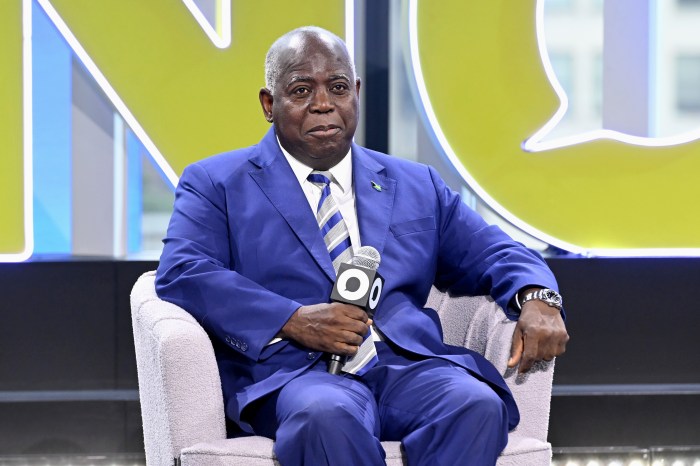Much has been said about the Windrush Generation.
The reference to Caribbean nationals who crossed the Atlantic from 1948 to 1971 applies to British colonial citizens recruited to help rebuild the Empire following World War II.
At the time, the crown ruler and Parliament required help to bolster the diminished labor force there.
To meet the demand, a ship named the MV Empire Wimbush was tasked with transporting 492 immigrants from their West Indies homelands to first dock in Tilbury on June 22, 1948.
Guyana-born Eustace Edward Ricardo Braithwaite arrived in Britain during war time and without hesitation volunteered for service in the Royal Air Force.
Braithwaite was an educated man.
An accredited novelist, he earned both a masters degree and doctorate in physics from Cambridge University.
A child of privileged rearing, both his parents attended Oxford University.
His military assignment was to pilot bomber airplanes.
Despite his stellar credentials, following the war, the migrant from the colonial territory could not find work suiting his proficiency.
He settled for being a teacher.
Reportedly he worked at one of the seediest schools in London, teaching crude, rude, ignorant, racist high school-aged youths.
Throughout his tenure there, Braithwaite documented his immigrant experience which Hollywood re-interpreted to a winning box-office film they billed “To Sir With Love.”
Actor Sidney Poitier portrayed the lead character, a teacher who implemented his own standards of behavior to transform a classroom full of raucous, uncouth East Side London teenagers to conform as civilized, caring and esteemed graduates.
The film while focusing less on issues of immigration as Braithwaite intended — in music and trailer loads of themes, spotlight issues related to poverty, sociological deficiencies, peer pressure and an array of hindrances to success.
Through it all Poitier’s lead character exemplifies those defining a knight worthy to be called Sir.
Perhaps that’s why the unruly students addressed their teacher as “Sir.”
In 1974, Queen Elizabeth II knighted Poitier with the honorary title.
Sir Sidney Poitier was officially rewarded by the crown for being a distinguished citizen revered by Commonwealth nations.
In 2009, President Barack Obama bestowed the highest civilian honor on the American actor by presenting him the Medal of Freedom.
Of the 123 conferred citizens throughout his tenure, in his first year in office. the first Black president of the US honored the acclaimed Cat Island, Bahamas native.
Deserving as it was, the gesture by President Obama not only paid tribute to Poitier’s legacy of consistently presenting positive images onscreen but also repaid an act of kindness to his father.
In tribute to the iconic actor, The Guardian newspaper described the irony of the ceremonious presentation saying:
“Along with Belafonte and Jackie Robinson, (Poitier) he funded the African American Students Association, which provided university scholarships to Kenyan students.”
The retrospective obituary further detailed “Among the students who benefited from the program was a Kenyan called Barack Obama, who would later marry an American woman, and have a son with the same name. “
“It is impossible to ignore the parallels between Poitier and Obama.”
In elaboration of their assertion, the newspaper added: “When, in Guess Who’s Coming to Dinner, (Poitier’s character’s girlfriend) Joanna’s father (Spencer Tracy) asks Prentice (Poitier’s character) if he has thoughts about the consequences of having children, Prentice tells him that “she feels that every single one of our children will be President of the United States, and they’ll all have colorful administrations,”
“What people saw in candidate and President Obama,” the obit punctuated, “they had seen decades before in the Poitier persona: cool, eloquence, genuine warmth, exceptionality, and ambiguity of identity. It was clear … Poitier had primed the white American imagination … for the historic election of the first Black President of the United States.”
Throughout his storied career Poitier vowed to portray uplifting images of his people. In an interview he explained how he demanded re-write of a scene in the script for the movie “In The Heat of the Night.”
Signed by a film studious to portray a Philadelphia detective from the north, the character is sent to help unravel a murder case in the south.
His investigation leads him to the home of a prominent southerner who resents the suspicions of a Black man.
Without hesitation he executes southern, white privilege registering a slap to the face of the investigator.
With a swift clap-back to the face, Mr. Tibbs, returned the offense.
Many described the response as “a slap heard all over the world.”
Poitier spoke candidly about his insistence on ensuring the revision before starting the film. The proud thespian said he felt it was compulsory to accurately execute his role because he ‘could not live with’ himself knowing the entire world would see him accepting physical rebuke from a white man without returning retribution.
Poitier’s appropriate action to the entitled southerner in the film singlehandedly cemented his purposeful mission of projecting positive images to the public.
It was one of three performances that year that defined Poitier’s choices.
The others included his romantic pairing with a white woman in “Guess Who’s Coming To Dinner” and the much acclaimed “To Sir With Love.”
His body of work is exemplary, consistent with his vow to always dignify his race, his portrayal of a doctor in love with a white woman in “Guess Who’s Coming To Dinner” amplified a capacity to inform America about a population denied positive and balanced representation.
He was rewarded by the National Academy of Motion Pictures with an Oscar in 1967 for portraying benevolence to needy nuns in the movie “Lilies Of The Field.”
There and then his role also exhibited eloquence, dignity and ambition.
Not as much acclaim has been attributed to the films Poitier acted and directed specifically targeting Black audiences — “A Piece of the Action,” “Buck & The Preacher,” “A Raisin In The Sun,” “For Love of Ivy,” “Stir Crazy,” “Uptown Saturday Night,” “Let’s Do It Again.”
Along with longtime friend, fellow actor, Harry Belafonte, their shared Caribbean heritage of being raised in island settings; migrating north as teenagers, and embrace of the Civil Rights movement — bonded a relationship that elevated the status of the most underserved populous in America.
Poitier’s dignified façade was often criticized by the people he gracefully portrayed. Like many Caribbean immigrants of the era, he was vilified and maligned for being sheepish, some even described him Uncle Tom.
In fact, he acted contrary to the assertion during the Jim Crow era when Blacks were persecuted for being Black,
Reportedly, Poitier accompanied Belafonte to Jackson, Mississippi to deliver cash to Stokely Carmichael’s Student Non-violent Coordinating Council (SNCC).
Carmichael AKA Kwame Toure, another Caribbean native who was born and raised in Trinidad until age 11 when he migrated to the Bronx — was a student activist/leader renowned for being an agitator and proponent of a Black power philosophy.
At the time, the Ku Klux Klan openly flaunted their might throughout the south as ultra-ambassadors of white supremacy.
Poitier ignored the risks. Together with his Caribbean accomplice defying challenges that could have derailed his career.
His public endorsement of Dr. Martin Luther King Jr., has been well documented. And when his friend in the Bahamas sought election for leader of his Caribbean islands, Poitier rushed to publicly endorse Sir Lynden Pindling, the first Black premier,
Poitier died on Jan. 6 at age 94.
Reportedly, more than a year ago Oprah Winfrey began collaboration to executive produce a documentary directed by Reginald Hudlin.
Allegedly, Poitier’s family already endorsed an in-depth feature about the son of the Caribbean, born prematurely to parents visiting Miami, Florida to sell tomatoes.
How he emerged a champion, revered actor and beloved role model will likely add to a legacy of a life well lived.
The documentary will be released by Apple Original Films.
Here in New York, “Sidney” may be coming to Broadway.
Reginald Santiago Hudson is poised to direct a play based on Poitier’s autobiography “The Measure of a Man.”
From a grateful, Caribbean community to a father of six girls, role model, ambassador extraordinaire – Thanks “To (you) Sir Poitier With Love.”
Catch You On The Inside!


























